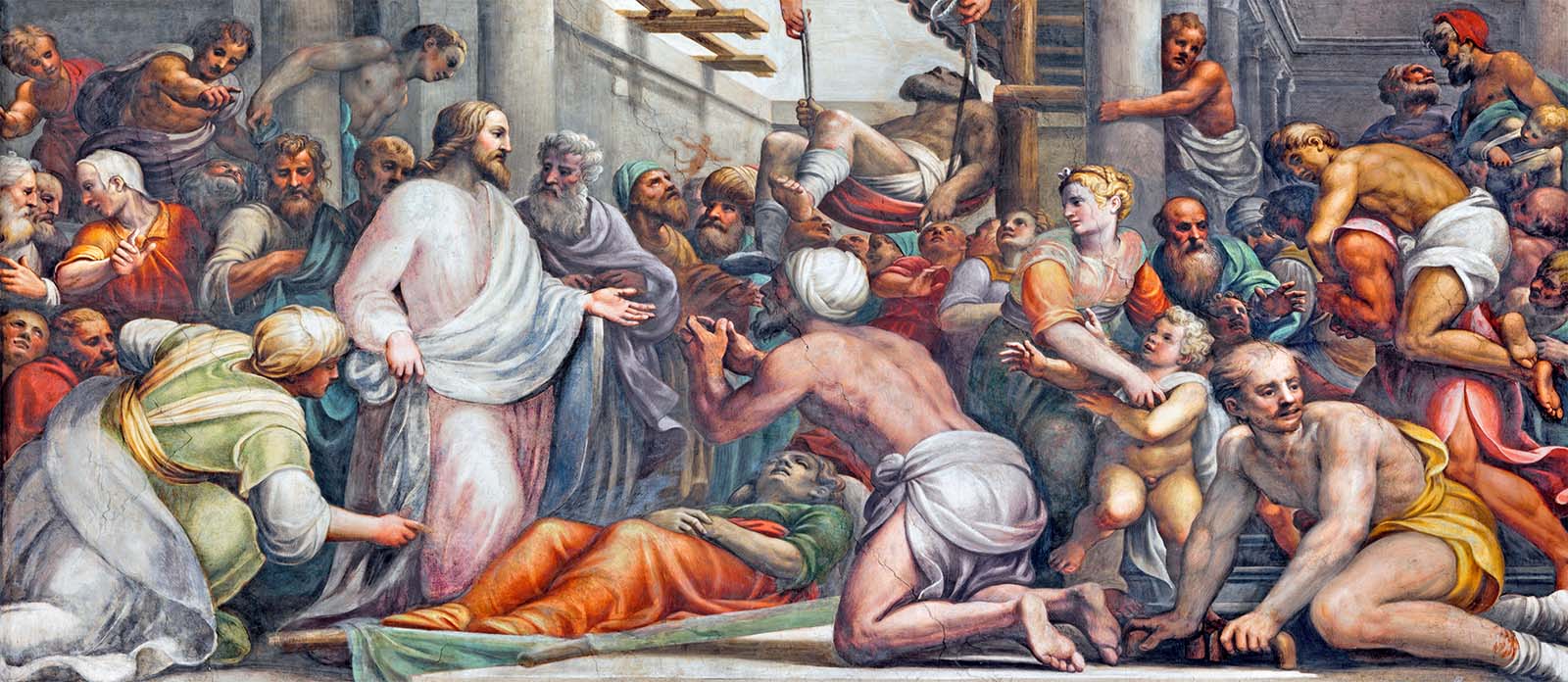“He was driving out a demon [that was] mute, and when the demon had gone out, the mute person spoke and the crowds were amazed. Some of them said, ‘By the power of Beelzebul, the prince of demons, he drives out demons.’
Others, to test him, asked him for a sign from heaven.
But he knew their thoughts and said to them, ‘Every kingdom divided against itself will be laid waste and house will fall against house. And if Satan is divided against himself, how will his kingdom stand? For you say that it is by Beelzebul that I drive out demons. If I, then, drive out demons by Beelzebul, by whom do your own people drive them out? Therefore they will be your judges.
But if it is by the finger of God that [I] drive out demons, then the kingdom of God has come upon you.
When a strong man fully armed guards his palace, his possessions are safe. But when one stronger than he attacks and overcomes him, he takes away the armor on which he relied and distributes the spoils.
Whoever is not with me is against me, and whoever does not gather with me scatters.’” (Luke 11:14-23)
Recently on The Faith Explained, Cale took a deeper look at this passage to examine Jesus’s power to expel demons, why the Pharisees didn’t trust Jesus, and why their argument against Jesus made no sense.
To begin, Cale clarified the term “Beelzebul” which ironically translates to “Lord of the High Place”. It came from the pagan Canaanite god Baal but was eventually adopted to refer to Satan or the devil. Similarly, the word Beelzebub was used almost interchangeably with Beelzebul but had a very different meaning. Beelzebub was a way to sarcastically refer to the devil by calling him “Lord of the Flies” instead of Lord of the High Place.
In other words, the Canaanites who were infamous for some horrific practices had actually been worshipping Satan this whole time, mistaken that he was actually their god. This case of mistaken identity can be applied to many of the pantheons of pagan religions. Of the plethora of false gods, many of them simply don’t exist, but many of them are demons, capable of leading people astray.
So, in essence, the Pharisees were saying that Jesus was only able to cast out demons because he was one of these demons in league with Beelzebul, Satan. It’s worth noting that the thing being contended in this case was not whether Jesus could perform the miracles or not. It was well-established that He could. There were thousands of witnesses to His work of curing the sick, the blind, the lame, the mute, and even the dead. Rather, the Jewish authorities were concerned with what His source of power was. Was it God? Or was it Satan?
The Pharisees asked for a sign from heaven, convinced that Jesus was an agent of evil. But in words that would come to be used by President Abraham Lincoln, Jesus responds by saying they are seeking to sow discord and division. He, just as they claim, is also on the side of God. “Every kingdom divided against itself will be laid waste and house will fall against house.” (Luke 11:17)
If Jesus’s source of power was Satan, then why would He cast out the demons? They would be His allies, doing the very difficult work of Satan. Would Jesus, to prove a point, undermine all of the work of His master? And further, if Jesus was sent from Satan, then who sent all of the Pharisee’s exorcists? Who gave them authority over demons? Surely, they would defend their ability to heal the possessed, just as Jesus did. Not to mention, Jesus was far more effective at driving out demons than the others were. Many times, the others’ attempts were ineffective.
Jesus goes on to say in no uncertain terms that it is by the “finger of God” that He casts out these demons. This passage is reminiscent of when Moses was trying to convince the Israelite people that He was the conduit through which God was leading His people. After all, it was the finger of God that inscribed the Ten Commandments on the stone tablets.
“The other thing that should jump out at you when Jesus mentions the finger of God is the book of the Exodus. When Moses leads the Israelites out of Egypt, God has to do all these miracles – He sends all these plagues – to try to convince Pharaoh to let His people go.”
And again, we see a mention of the finger of God:
“Though the magicians did the same thing to produce gnats by their magic arts, they could not do so. The gnats were on human being and beast alike, and the magicians said to Pharaoh, ‘This is the finger of God.’ Yet Pharaoh hardened his heart and would not listen to them, just as the LORD had said.” (Exodus 8:14-15)
When an owner guards his house, his possessions are safe, until a stronger one comes and overtakes him. Then that assailant has possession of the house and possessions. But in this case, the stronger one is Jesus, and He is coming to free the hostages of Satan from this supernatural possession.
Tune in to The Faith Explained weekdays at 12:30pm CT


